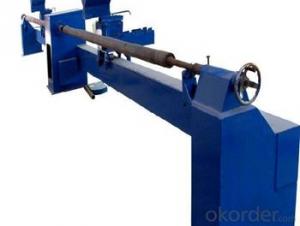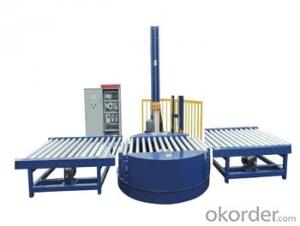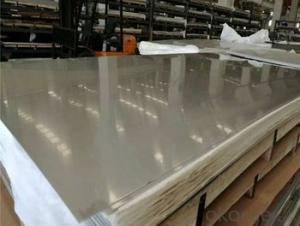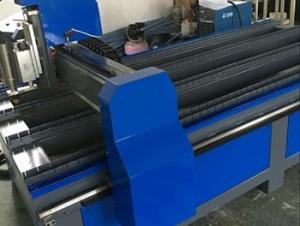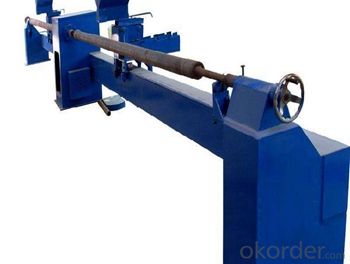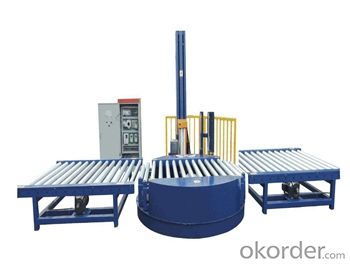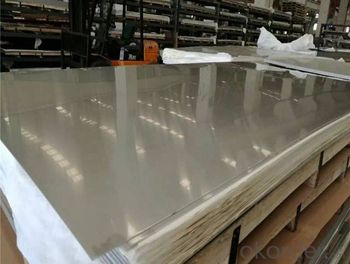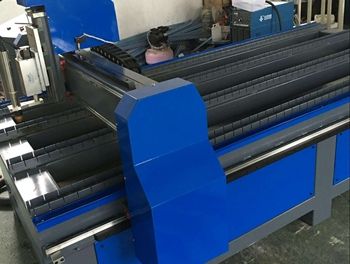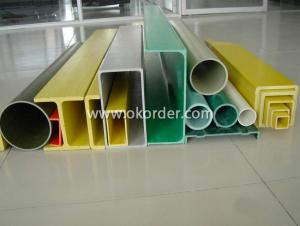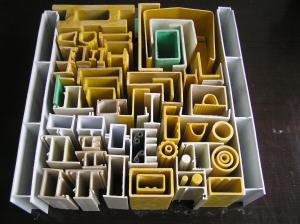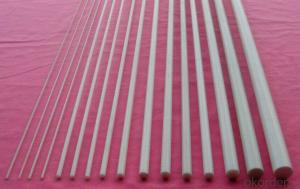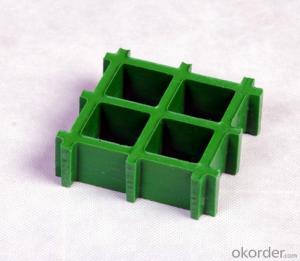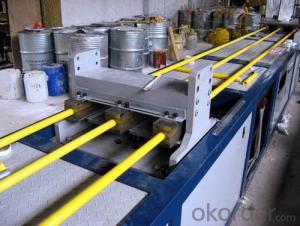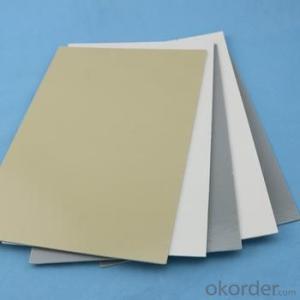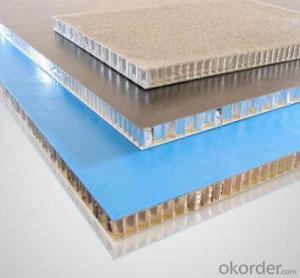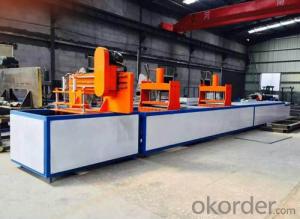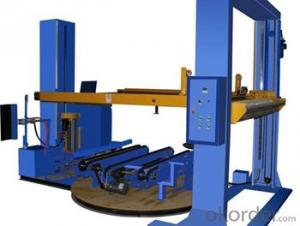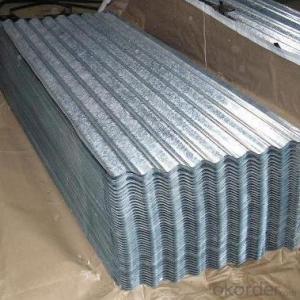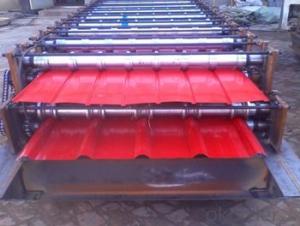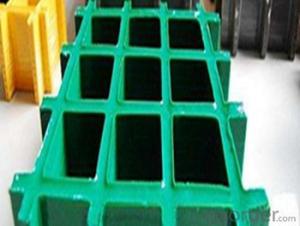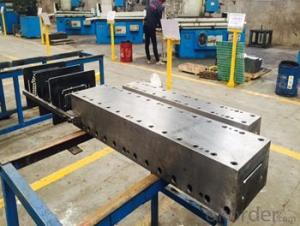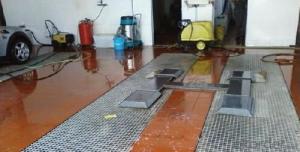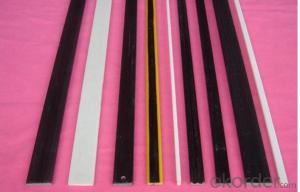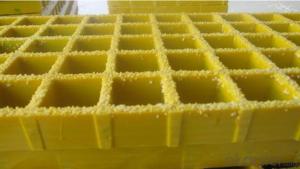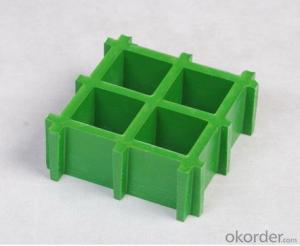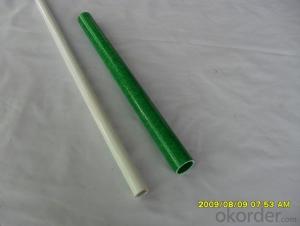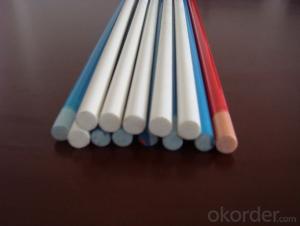FRP Pultrusion Profiles - Pultruded Gratings with Safe, Anti-Slip, and Best Quality
- Loading Port:
- Tianjin
- Payment Terms:
- TT OR LC
- Min Order Qty:
- 14 m.t.
- Supply Capability:
- 300000 m.t./month
OKorder Service Pledge
OKorder Financial Service
You Might Also Like
PRODUCT DESCRIPTION
Pultruded grating is made by a particular assembly process, which using “I” shape as its main load-bearing and special rod to go through the bearing bar. Pultruded grating include the standard grating and the custom grating, the custom grating can be designed to meet customer’s requirement or special using condition by changing the shape, size and space of the bearing bars, the surface can be covered with lozenge panel, grit panel, or added the anti-slippery sand directly.
FRP pultruded grating has the most characteristics of molded grating, but it has its distinct advantages, it has very high fiberglass content in the loading direction, so it has very high load capability, it has more superiority when used at wide span, so that the basic support will be decreased and the project cost will be reduced accordingly.
SPECIFICATION
The standard space between two crossbars is 6 inch or 12 inch.
Thickness (mm) | Bar width (mm) | Open space (mm) | Open rate (%) | Approx weight (kg/m |
25.4 | 15.2 | 22.8 | 60 | 13.2 |
25.4 | 15.2 | 15.2 | 50 | 15.9 |
25.4 | 15.2 | 10.1 | 40 | 18.5 |
25.4 | 40 | 10.8 | 21 | 14.5 |
38.1 | 15.2 | 22.8 | 60 | 15.8 |
38.1 | 15.2 | 15.2 | 50 | 19.1 |
38.1 | 15.2 | 10.1 | 40 | 22.4 |
50.8 | 25.4 | 25.4 | 50 | 16.6 |
50.8 | 25.4 | 12.7 | 33 | 21.1 |
CHOICE FOR PULTRUDED GRATING
Resin: GP resin, ISO resin, VE resin, Phenol resin
Color choice: Yellow, gray, green, custom color
Surface choice: Groove surface, grit surface, lozenge cover surface
FEATURES
a. Anti-corrosion and anti-rust
b. Light weight and high strength
c. Anti-flammable
d. Anti- fatigue
e. Safe and anti-slippery
f. Anti-ageing
g. Easy of maintenance
h. Excellent electromagnetism property
i. Good economic benefit
FIELDS SERVED
Sewage treatment,
water supply and drainage,
chemical industry,
oil industry,
power engineering,
pulp and paper,
construction engineering,
spinning, marine engineering.
APPLICATION
Operation terrace,
stair walkway,
ground floor,
trench cover,
sidewalk,
foot bridge,
equipment safety fence,
scaffold.
COMPANT DESCRIPTION
CNBM,China National Building Materials Group is a state-owned enterprise in charge of administrative affairs in china building materials industry. Established in 1984, CNBM is a large group corporation of building materials with total assets of 25 billion RMB and a total staff of 30,000.CNBM now owns 200 subordinating firms of solely owned and joint-venture companies.
CNBM International Corporation is one subsidiary of CNBM, we focus on offering good-quality products,professional service and complete solution to our customers. Strong delivery capacity, advanced technology& management, strong financing capability and excellent after-sale service are our advantages in sharing international market.
FAQ
Q1.What's your sample policy?
A:We can supply the sample if we have ready parts in stock, but the customers have to pay the courier cost.
Q2.Can you produce according to the samples?
A: Yes, we can produce or modify the products according to your request.
Q3.How do you deliver the goods to my country?
A:We can provide international express, such as DHL, EMS, UPS, FedEx, etc. We select air freight and sea freight upon your requests. Quotations if without mentioning the shipping costs are shipping fee excluded.
Q4.How much does it cost to ship to my country?
A:When you goanna to place an order, please contact us, because different country has different freight.
Q5.How to get the catalogue?
A:please contact us and tell us what you are looking for
PICTURES
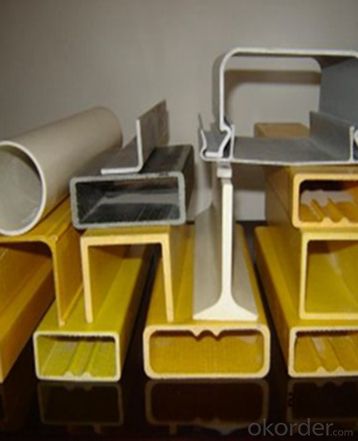
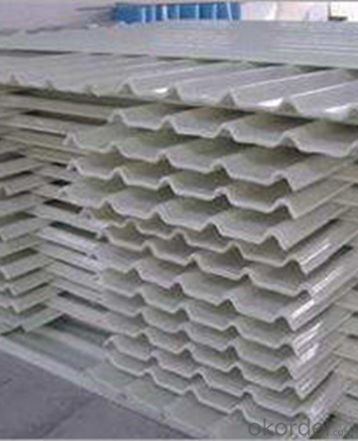
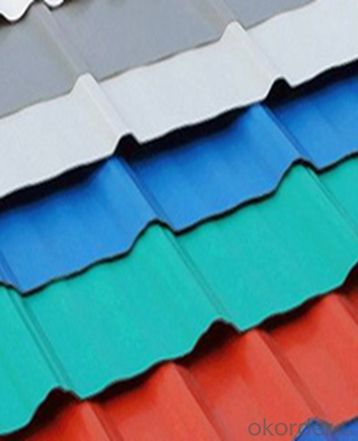
- Q: Can FRP pultrusion profiles be used in water treatment plants?
- Yes, FRP pultrusion profiles can be used in water treatment plants. FRP (Fiber-Reinforced Polymer) is a corrosion-resistant material that is well-suited for water treatment applications. It is lightweight, durable, and has excellent chemical resistance properties, making it ideal for use in environments with exposure to water and various chemicals. Additionally, FRP pultrusion profiles offer design flexibility and can be customized to meet specific project requirements.
- Q: Can FRP pultrusion profiles be used in the water treatment industry?
- Indeed, the water treatment industry can make use of FRP pultrusion profiles. These profiles, made of Fiber Reinforced Polymer, are widely recognized for their exceptional resistance to corrosion, impressive strength, and long-lasting durability. These qualities render them highly appropriate for a diverse range of applications within the water treatment field. In particular, FRP pultrusion profiles can be employed in the construction of water treatment tanks, pipes, and other crucial infrastructure. They exhibit remarkable resistance to chemicals, including those commonly employed in water treatment procedures. This resistance to corrosion ensures that equipment enjoys an extended lifespan and maintenance costs are minimized. Moreover, FRP pultrusion profiles boast an impressive strength-to-weight ratio, making them an ideal choice for applications that necessitate lightweight yet robust materials. This quality facilitates the easier installation and transportation of water treatment equipment. Furthermore, the flexibility in design offered by FRP pultrusion profiles is worth noting. Such profiles can be manufactured in a wide array of shapes and sizes to cater to specific project requirements. This capability allows for the customization and optimization of water treatment systems, guaranteeing the efficiency and effectiveness of water treatment processes. In summary, FRP pultrusion profiles present themselves as a dependable and cost-effective option for the water treatment industry. Their excellent resistance to corrosion, exceptional strength, and design flexibility make them highly suitable for numerous applications within water treatment systems.
- Q: Can FRP pultrusion profiles be used in the water and wastewater treatment industry?
- Yes, FRP (Fiber Reinforced Polymer) pultrusion profiles can be used in the water and wastewater treatment industry. FRP pultrusion profiles are highly durable, corrosion-resistant, and have excellent mechanical properties, making them suitable for various applications in the water and wastewater treatment industry. One of the main advantages of FRP pultrusion profiles is their resistance to corrosion. Water and wastewater treatment facilities often deal with aggressive chemicals, high humidity, and corrosive environments. Traditional materials like steel or wood may deteriorate and require frequent maintenance or replacement. However, FRP pultrusion profiles are specifically designed to withstand harsh conditions without corrosion, ensuring long-term performance and reducing maintenance costs. Additionally, FRP pultrusion profiles offer excellent strength-to-weight ratio, making them ideal for structural applications in water and wastewater treatment facilities. They can be used as walkways, handrails, grating, ladders, and other structural components. The lightweight nature of FRP profiles allows for easy installation and minimizes the load on the supporting structures. Furthermore, FRP pultrusion profiles are non-conductive, providing an added safety benefit in water and wastewater treatment facilities. This property is particularly important when dealing with electrical equipment or applications near water sources, reducing the risk of electrical hazards. Moreover, FRP pultrusion profiles can be customized to meet specific design requirements, including different shapes, sizes, and colors. This flexibility allows for greater design freedom, ensuring that the profiles can be tailored to fit the specific needs of water and wastewater treatment projects. Overall, the use of FRP pultrusion profiles in the water and wastewater treatment industry offers numerous advantages, including corrosion resistance, high strength, lightweight, non-conductivity, and design flexibility. These qualities make FRP profiles a reliable and cost-effective choice for various applications in this industry.
- Q: Are FRP pultrusion profiles resistant to fuels?
- Yes, FRP (Fiber Reinforced Polymer) pultrusion profiles are highly resistant to fuels. Due to their inherent corrosion resistance and non-reactive nature, FRP pultrusions can withstand exposure to a wide range of fuels, including gasoline, diesel, and aviation fuels, without deteriorating or losing their structural integrity. This makes them suitable for various applications in industries such as automotive, aerospace, and oil and gas, where resistance to fuel exposure is crucial.
- Q: Are FRP pultrusion profiles suitable for the manufacturing of chemical pumps?
- Yes, FRP pultrusion profiles are suitable for the manufacturing of chemical pumps. FRP (Fiber Reinforced Plastic) offers excellent chemical resistance, high strength, and corrosion resistance, making it an ideal material for chemical pump applications. The pultrusion process ensures consistent quality and dimensional stability, allowing for precise manufacturing of pump components. Additionally, FRP pultrusion profiles have a long service life and require minimal maintenance, making them a cost-effective choice for chemical pump manufacturers.
- Q: Are FRP pultrusion profiles resistant to electrical surges or lightning strikes?
- FRP pultrusion profiles have inherent electrical insulation properties due to their composition of fiberglass reinforcement and resin matrix. This insulation makes them resistant to electrical surges and lightning strikes to some extent. However, it is important to note that no material can provide absolute protection against extremely high voltage electrical surges or direct lightning strikes. In such cases, additional measures like grounding and lightning protection systems are necessary to ensure the safety of structures or equipment. Therefore, while FRP pultrusion profiles offer some level of resistance to electrical surges and lightning strikes, it is advisable to consult with experts and adhere to relevant safety standards when designing and installing electrical systems in areas prone to such events.
- Q: What are the limitations of FRP pultrusion profiles?
- Some limitations of FRP pultrusion profiles include limited design flexibility, susceptibility to UV degradation, potential for delamination or fiber breakage under high impact or bending loads, and difficulty in achieving complex geometries. Additionally, FRP pultrusion profiles may have higher initial costs compared to traditional materials, and the availability of large-scale production may be limited.
- Q: Can FRP pultrusion profiles be used in the production of electrical insulators?
- Yes, FRP (Fiber Reinforced Polymer) pultrusion profiles can be used in the production of electrical insulators. FRP pultrusion profiles are known for their excellent electrical insulation properties, making them suitable for a wide range of electrical applications. The high-strength and non-conductive nature of FRP materials make them ideal for insulating components in electrical systems, including insulators. FRP pultrusion profiles are made by impregnating continuous fibers, such as fiberglass, carbon fiber, or aramid, with a polymer resin, which is then cured and shaped using the pultrusion process. This results in a durable and lightweight material that offers excellent electrical insulation properties. Electrical insulators are used to prevent the flow of electric current between conductive materials or components. They are essential in electrical systems to maintain safety and prevent electrical leakage or short circuits. FRP pultrusion profiles can be designed and manufactured to meet the specific requirements of electrical insulators, including dimensional accuracy, mechanical strength, and electrical insulation performance. Additionally, FRP pultrusion profiles offer several advantages over traditional materials like wood, porcelain, or ceramics. They are corrosion-resistant, have a high strength-to-weight ratio, and can be easily customized to meet the specific needs of electrical insulator applications. FRP pultrusion profiles are also non-conductive, which is a crucial factor for electrical insulation. Overall, FRP pultrusion profiles are highly suitable for the production of electrical insulators due to their excellent electrical insulation properties, durability, lightweight, and customization options.
- Q: What are the different surface finishes available for FRP pultrusion profiles?
- Some of the different surface finishes available for FRP pultrusion profiles include smooth, textured, non-skid, and glossy finishes. These finishes can enhance the aesthetics, improve grip, and provide protection against UV radiation and corrosion.
- Q: Can FRP pultrusion profiles be used in the construction of pedestrian bridges?
- Yes, FRP pultrusion profiles can be used in the construction of pedestrian bridges. FRP pultrusion profiles offer several advantages such as high strength, corrosion resistance, low maintenance, and lightweight properties, making them suitable for pedestrian bridge applications. Additionally, the flexibility in design and customization options of FRP pultrusion profiles allows for efficient construction and installation of pedestrian bridges.
Send your message to us
FRP Pultrusion Profiles - Pultruded Gratings with Safe, Anti-Slip, and Best Quality
- Loading Port:
- Tianjin
- Payment Terms:
- TT OR LC
- Min Order Qty:
- 14 m.t.
- Supply Capability:
- 300000 m.t./month
OKorder Service Pledge
OKorder Financial Service
Similar products
Hot products
Hot Searches
Related keywords
